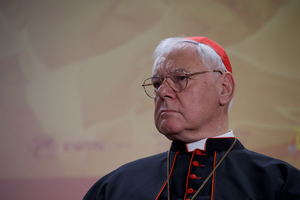Can Humanae Vitae’s Teachings Change?
Analysts who spoke with the Register stressed that any reinterpretations must be in full doctrinal continuity with Paul VI’s countercultural message.

As speculation mounts about a possible revision or reinterpretation of Blessed Paul VI’s landmark encyclical Humanae Vitae to coincide with its 50th anniversary July 25, what kind of changes, if any, would be permissible?
Published in 1968, Humanae Vitae reaffirmed the Church’s prohibition of contraception, approved natural family planning (NFP) methods, and developed the Church’s teaching to stress two essential meanings of the conjugal act: the unitive and procreative, which are “inseparably connected” to each other.
It caused a sensation when published. In the wake of the sexual revolution — when much of the world had accepted birth control — and after a five-year study by a pontifical commission whose majority had advised Paul VI to approve artificial contraception, Paul VI’s reaffirmation that contraceptive use is “intrinsically wrong” made it one of the most controversial encyclicals in Church history.
Many Catholics, especially in the pro-life movement, have long upheld Humanae Vitae as prophetic. They have based such a view on the fact that the widespread acceptance of birth control has separated the unitive and procreative meaning of sexual relations, leading to a trivialization of sexual relations that, in turn, has resulted in promiscuity, extensive abortion and the arrival of same-sex “marriage” that occurred in the context of the rapid normalization of homosexual behavior in Western nations.
In spite of this, concerns have arisen in recent months that some Vatican officials may try to undermine the encyclical’s teaching, pushed by those who have long dissented from the encyclical.
Various examples of apparent pressure to revise or reinterpret the document have emerged, ranging from the appointing of public and overt dissenters of the encyclical to the Pontifical Academy for Life and to a secretive Vatican commission charged with making a historical-critical assessment of the encyclical, to papal comments praising prominent opponent of Humanae Vitae Bernard Häring, and a campaign in the Italian bishops’ newspaper Avvenire to soften the document’s teaching.
In June, Avvenire’s chief editor, Luciano Moia — a leading proponent for a reinterpretation of the encyclical — published what he called 10 “uncomfortable” points to reflect upon. These included the assertion that Paul VI decided not to declare Humanae Vitae infallible; that the “vast majority” of “practicing” couples (which he estimates to be 90%-95%) no longer use “natural methods” of family planning for various reasons; and that the questionnaires of the two recent Synods on the Family showed that “the problem of contraception has less and less ethical relevance.”
Moia also declared in his first point that the crux of the encyclical was the “indissoluble relationship between conjugal love and fecundity.” Although the statement is true, staunch defenders of the encyclical say the inseparability principle is not about the indissoluble connection between marital love and fruitfulness, but instead between marital sexual acts being open to the creation of a new human life.
“The encyclical does not speak about marital love here, but about marital acts,” said Stephan Kampowski, a professor of philosophical anthropology at the Pontifical John Paul II Theological Institute in Rome. “This is crucial,” he said, quoting from Humanae Vitae, 14, which stresses the “unitive significance and the procreative significance which are both inherent to the marriage act,” and which “man on his own initiative may not break.”
Moia’s list was tweeted June 24 by Msgr. Gilfredo Marengo, the coordinator of the Vatican commission examining the encyclical, with the words: “Towards 50 years of Humanae Vitae, a useful status quaestionis (state of investigation).” However, it’s not clear whether or not he endorsed Moia’s points.
Teaching Opportunity
The persistence of widespread dissent from Humanae Vitae is nothing new. Immediately after its publication, July 25, 1968, many clerics and academics outright rejected its teachings, resulting in much of its fundamentally important doctrine never being properly taught.
Theologians contacted in late June by the Register therefore believe that the most welcome and acceptable change on its 50th anniversary would be to have the encyclical taught effectively — starting with bishops and priests.
“Many bishops, like many priests and others at the time of Humanae Vitae and since, have perhaps never read the text of the encyclical fully or attentively or often do not understand it,” said Father George Woodall, professor of moral theology at the Pontifical Regina Apostolorum Athenaeum in Rome. He also said “too many” bishops and priests were “left ‘at sea’ and never received any sympathetic explanation” for the encyclical’s contents, “or they allowed themselves to be swept along by media pressure and public opinion.”
The view was echoed by Kampowski, who believes “the greatest need for development with respect to the message of Humanae Vitae lies with teaching it repeatedly and with confidence.”
The German professor noted that the argument being used by some to reverse, or as they put it “develop,” the encyclical’s central teaching, namely their claim that only few Catholics follow it, would be an “admissible argument” only if one had “actually tried to teach it and failed.”
Kampowski said that in the “few places” where the encyclical has been properly taught, the spiritual fruits have been “abundant.” He cited as examples the Neocatechumenal Way and other ecclesial movements, as well as some “flourishing parishes,” particularly in the United States. By contrast, he noted that where its teaching has been “ignored,” the spiritual harm has been “rampant,” referencing his native Germany as a nation of “empty pews,” where bishops were among the “first to reject Paul VI’s encyclical.”
For Father Woodall, particular elements could be better taught, such as the fact that the encyclical did not condemn only “artificial” contraception, but also any act that may “operate in such a way that procreation may be impeded.” He said the word “artificial” has been badly translated from the Latin, whereas the word “deliberately” would be a more correct rendering.
Professor Josef Seifert, the president of the newly founded John Paul II Academy for Human Life and the Family, believes it would be “permissible and good” to explain more what Humanae Vitae means by “the generous openness to new life.” He said that a “normal parental attitude” should mean “leaving it wholly to God how many children he wants to give us.”
In Humanae Vitae, Paul VI allowed for the use of natural family planning if “there are serious motives to space out births, which derive from the physical or psychological conditions of husband and wife, or from external conditions” (16). Under the pontificate of John Paul II, “just reasons” for NFP were elaborated upon under the principle that generosity, not selfishness, motivates the couple’s behavior in seeking responsible parenthood.
No Doctrinal Change
The scholars contacted all ruled out that the doctrine could ever be altered.
“Doctrine that has been definitively proclaimed cannot be changed either in the sense of denying or contradicting what has been taught, or by asserting what is incompatible with such truth,” said Father Woodall. If there were to be an “authentic development of doctrine,” he added, “this would neither entail nor imply any of these possibilities, but would deepen some particular point of prior doctrine, maintaining that doctrine intact.”
Those suggesting such a development would then be obliged to show that whatever they were proposing did not violate this principle and was compatible with “constant definitive doctrine.”
Someone who failed in this regard, Seifert pointed out, was Father Maurizio Chiodi, a new member of the Pontifical Academy for Life, who denied recently that contraception is an intrinsically evil act and argued that it is an obligation for some couples to contracept “for the sake of responsibility.”
Father Chiodi, a professor of moral theology at the Northern University of Italy in Milan, was asked to comment for this article, but he declined.
Father Chiodi’s thesis, which drew on the Pope’s apostolic exhortation on the family, Amoris Laetitia (The Joy of Love), was “totally inadmissible and a radical break with Church teaching,” Seifert maintained.
“If the Pope were to accept these changes, he would accept a total ethical error and a huge heresy,” he said. “Any Catholic should pray that the Pope will reject this ‘new paradigm’ that is nothing else than an old ethical error and the very destruction of the moral teaching of the Church.”
An example of an acceptable development or explanation of doctrine, Seifert said, would be to show that separating the procreative and unitive meaning of the conjugal act is not the only reason showing contraception is wrong; other reasons showing its immorality need to be developed.
Said Seifert, “This would be no change of Humanae Vitae’s teaching, and even less a change of the eternal truth it proclaims, but a complementation and completion of its argumentation for the inviolable truth that contraception is intrinsically wrong.”
Father Gahl
“Despite great effort on the part of the past three popes, Humanae Vitae continues to be misunderstood and underappreciated,” Opus Dei Father Robert Gahl, associate professor of ethics at the Pontifical University of the Holy Cross in Rome, told the Register. “In accord with his predecessors, including St. John Paul II and Benedict XVI, Pope Francis wants the truth fully found in the Person of Jesus Christ to shine forth in the life of ordinary Christians and to do so with joy and exultation.”
Addressing the question of what fresh insights might be acceptably drawn from the encyclical, Father Gahl noted, “The Church’s teaching must always respect and confirm the truth about spousal love as that kind of friendship that is inherently open to new life. But new explanations and new pastoral programs may develop the doctrine, not by changing it, but by clarifying it, and offering new paths for conformance to that same doctrine.”
Continued Father Gahl, “One such area of recent pastoral development is that of the practice of fertility awareness whereby, in full accord with Blessed Paul VI’s prophetic encyclical and St. John Paul II’s theology of the body, the married couple express their capacity to give life in a more mindful and human way.”
While Father Gahl acknowledges that many Catholics are not heeding the encyclical’s teachings on the immorality of contraception, he insists this is no reason to stop proclaiming its life-affirming message.
“The lack of appreciation for the beauty of the Church’s moral teaching is certainly a challenge for all who have pastoral responsibilities in the Church,” he said. “The very object of Christian faith is divine Revelation, as handed down by the Church’s Tradition.”
“Christian faith is not determined by popular vote,” he said, “and, if there were such a vote, as Benedict once commented, the saints in heaven must be counted, too, among the electors.”
Edward Pentin is the Register’s Rome correspondent.

















